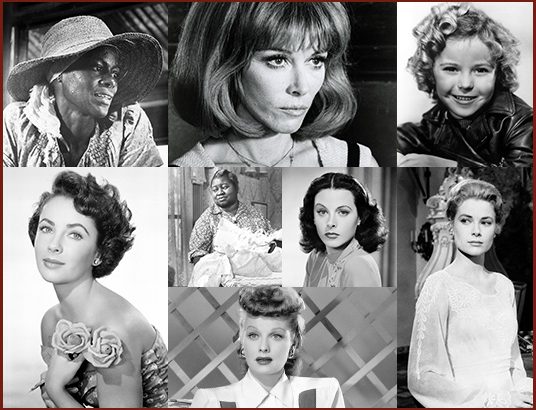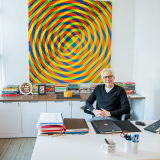
Emily Carman on Hollywood’s Trailblazing Women
September 29, 2016
I was invited to participate in Turner Classic Movies’ Trailblazing Women Series on ‘Actresses Who Made a Difference’, which is co-sponsored by Women in Film. This multi-year programming initiative aims to shine a spotlight on the historical contributions of women working in the film industry, to raise awareness of the current under-representation of women in positions of power within the business, and to promote resources that empower women to participate more fully in the industry.
Each Tuesday and Thursday in October, TCM will spotlight various actresses, from Mary Pickford and the powerful women at the dawn of the film industry in the 1910s-20s, through the zenith of the studio system in the 1930s and 1940s (Bette Davis, Olivia de Havilland, Myrna Loy, and many more), to victims of the Hollywood Blacklist and McCarthyism (Lee Grant), to the strides made by women of color actresses (Anna May Wong, Rita Moreno, Dorothy Dandridge), and finally to more contemporary actresses who had complimented their acting careers with social activism to promote a variety of causes (Jane Fonda and Susan Sarandon).
All of the women highlighted in this series had distinguished acting careers that alone established an important precedent for women in film, but coupled with their social, political, and/or philanthropic activism off-screen, their efforts went well and beyond the expectations of an actress and a woman for their time. Thus, their legacy should encompass both their film career and off-screen efforts and activism.
As a film historian whose research specializes in mining the archives to uncover new insights about actresses and their multi-faceted careers, I recognize the larger aim of the series, that is to highlight the under-acknowledged legacies and contributions of women in Hollywood.
I co-hosted “Wartime Contributions”, with host Illeana Douglas, and we profiled the exceptional wartime service efforts of four actresses: Bette Davis, Marlene Dietrich, Hedy Lamarr, and Josephine Baker.

Davis’s acting legacy as a two-time Oscar winner (and recipient of ten Best Actress nominations) is well known, but her off-screen efforts during WWII such as starting the Hollywood Canteen, a restaurant where U.S. servicemen could mingle with Hollywood talent, have received less attention in the press.
“There are few accomplishments in my life that I am sincerely proud of. The Hollywood Canteen is one of them,” said Davis. She was later awarded the Distinguished Civilian Service Medal, the Defense Department’s highest civilian award, for running the Hollywood Canteen, in 1980.
Likewise, we remember Marlene Dietrich as a glamorous actress and stylish fashion icon of 1930s Hollywood. But the German born Dietrich became a U.S. citizen in 1939 and she whole-heartedly embraced the war effort, effectively putting her career on hold to perform for American troupes and the USO. She was the only USO performer who went within enemy artillery range, visiting U.S. servicemen on the European fronts and those wounded in military hospitals, was photographed in a military uniform, and slept in the same conditions as did the troops when performing on the front, made Anti-Nazi speeches in German, and logged in many hours hosting at the Hollywood Canteen. For all of this, she was awarded the Medal of Freedom by the U.S. (in fact she was the first woman to receive one in 1947, she called it “ her proudest moment”) and was also inducted into the French Legion of Honor.
Lamarr was promoted as “the most beautiful woman in films” in her day and maybe this pervades her overall legacy and until recently, certainly has overshadowed her off-screen accomplishments as an inventor and her work for the allied War effort in the U.S. during WWII. Lamarr was inspired to invent technology to aid the U.S. military and help them defeat the Nazis. Together with composer George Antail, she patented the technology for “frequency-hopping” that later served as the basis for spread-spectrum communication technology—and was a building block for our now ubiquitous digital, wireless technology. Our iPhones should have a “Hedy” assisting us rather than Siri.
African American Josephine Baker left the United States to achieve international fame in France, on the stage and in French films. However, she put her career on hold to aid her adopted country during WWII. During WWII, she served as a sub-lieutenant in the Women’s Auxiliary of the French Air force and she provided performances for French troops free of charge to boost their morale. She was a spy for the French resistance, smuggling military intelligence using invisible ink on her sheet music. An entertainer of Baker’s prominence would not be subjected to strip searching or intense scrutiny. For these efforts, she was the first American-born woman to receive the Croix de Guerre and the Rosette de la Resistance and to be made a Chevalier of the French Legion of Honor.
There is so much more to learn about these women and their contributions during WWII and beyond that expand our understanding of film history and the many roles that women played in their contributions to Hollywood and the causes that they advocated.
You can catch the Trailblazing Women series starting on Tuesday, October 4 at 5PM on TCM. Dr. Emily Carman’s hosted segments will air on Tuesday, October 11.
You can find out more about the series by visiting their website at: trailblazingwomen.tcm.com

